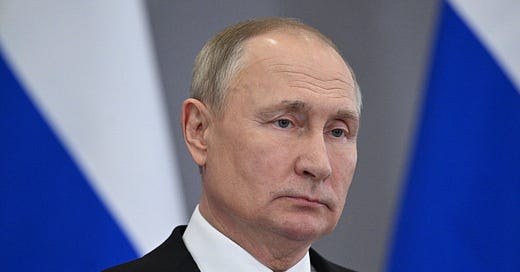Vladimir Putin might hold onto parts of Ukraine, but he's lost the bigger war.
Putin’s war in Ukraine was supposed to make Russia a superpower again. It was meant to cement his legacy as the man who restored Russia's historic empire, making him the czar of a new, stronger, feared Russia.
But even if Putin clings to stolen Ukrainian land, what has he truly won? An economy spiraling downward, global isolation, and a weaker, poorer country.
When Putin came to power in 1999, Russia was reeling from the chaotic post-Soviet 1990s. His early years brought stability and growth. Living standards rose, with GDP per capita increasing tenfold from 1999 to 2013. For a time, Russians enjoyed access to consumer goods, travel, and a semblance of middle-class life. From 2014, after he took Crimea and triggered initial sanctions, economic growth slowed to a crawl, averaging 1% annually.
Now, the war has made things far worse, reversing two decades of economic gains. Western sanctions severed access to technology, capital, and markets, while military spending drains resources from social needs. Inflation spiked, hitting double digits, and mortgage rates are over 20%. Before the war, Russians were getting by, even enjoying small comforts like Western goods and European vacations. Now they're cut off, as their standard of living takes a nosedive.
War costs more than money, of course. Over 100,000 young Russian men are dead, and more crippled from combat. Up to a million more fled the country, avoiding conscription and the war's brutal meat-grinder battles. And it’s happening in a nation already facing a population crisis, where birth rates lag far behind death rates.
Once-feared Russian weapons turned out to be outdated, poorly maintained, or easily defeated by Western tech. The country lost an estimated 3,600 tanks and thousands of other vehicles. His military's weakness is now public knowledge.
Putin's war also galvanized NATO, his longtime nemesis. Before invading Ukraine, NATO struggled with relevance, but has now expanded with Finland and Sweden joining. Geopolitically, Putin's Russia finds itself weaker, and his “buffer zone” is now a hostile frontline.
Culturally, too, Russia lost ground as its international reputation plunged. Before the war, Russia hosted global events like the World Cup and Olympics, symbols of international respect. Now, it’s banned from global stages.
What’s Putin’s prize for all this? A trashed Donbas—its factories rubble—and a Crimea that’s a money pit, costing billions to prop up. Even if Putin clings to his ill-gotten gains, he loses by winning. He takes over territory devastated by war, whose reconstruction will drain Russia's dwindling resources even further. Occupied regions don't immediately become assets—they become costly burdens.
Putin’s big plan was to flex imperial muscle, to make the world fear Russia again. Yet he’s achieved the opposite. Russia’s stuck, a gas station with nukes, run by a leader who’d rather bomb neighbors than build up his country.
However the war progresses, he’ll pose for photos, declare victory on state TV, and claim greatness. But Russia today is poorer, weaker, and lonelier because of Putin’s ambitions.
If that's victory, it's hollow at best—exactly as it deserves to be.
–Ken





This is an excellent analysis from a perspective we'll never see in the corporate media.
I don't know, but all I see is
US/NATO tanks burning
US/NATO aircraft conspicuously absent
NATO leaders with their daily 2-minutes hate against Russia
US/NATO begging Putin for a cease fire.
If that's Putin "losing", I'm sure he's happy to continue losing. Whatever gets the job done.